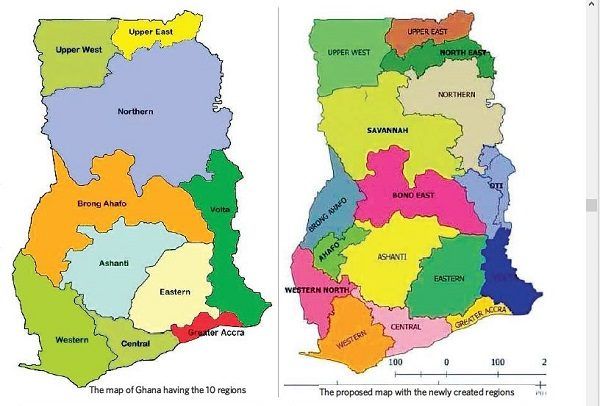
Addressing challenges facing the new regions
The challenges facing the six new regions in the country are numerous, ranging from the building of roads to the development of other forms of infrastructure such as extension of water and electricity, as well as hospitals and other health centres.
Addressing these challenges is very necessary because of its implication for peace, unity, progress and better life. Undoubtedly, the new regions are yearning for various forms of infrastructure development all aimed at improving upon the socio-economic status of residents in the affected areas.
Advertisement
These challenges and concerns are known to the government, as well as the commission that was instituted to go through the process of creating the six new regions in various parts of the country.
Having gone through the process successfully and legally brought the regions into being, we need to do all we can to ensure that each of the regions is formidably equipped in terms of capacity building to address the challenges ahead, hence the recent capacity building workshop organised for assembly members in these areas.
Similarly, the visit by the President to the new regions and the donation of a number of vehicles to them, as well as construction works for Regional Coordinating Council buildings and other infrastructure show that things are on course to bring the new regions up to the level of expectation as far as development is concerned.
The battle has just begun and must continue unabated to its logical conclusion. If the world today is moving towards much integration, then within the context of nationhood, Ghana will also have to move towards greater integration of its people.
One notable issue that came to light during and after the creation of the new regions was the siting of regional capitals. Some opinion leaders vigorously fought for the siting of the regional capitals in their hometowns or areas.
This did not come as a surprise, seeing that everyone would want his or her hometown to emerge as a regional capital so as to be able to attract and accumulate more development programmes.
The clamour for the regional capitals was based on the old paradigm of development which tends to focus on the siting of all development projects in the capital, leading to the neglect of substantial portions of remote areas within the same region.
The lesson learnt from the development of previous regional capitals, where all development projects were concentrated in the capital, is an outmoded paradigm that calls for immediate revision with regard to developing the new regional capitals In line with the new paradigm of development, a regional capital will no longer be made to possess all the good things that befit a regional capital but will ensure that all other development projects are consciously and equitably spread to all parts of the new regions that have just been created.
This way, there will be fairness and equity for all people residing in other parts of the region. For example, extension of ministries may be located in the regional capital but regional hospitals and the construction of flats for workers may also be located in other areas.
Similarly, all parts of the region will be endowed with good lighting and water systems, educational institutions as well as good and dependable roads, among others.
This is what will make everybody proud irrespective of whether your area or town is made the capital or not.
One notable fact is that the issue of decentralisation, which is a crucial tool for the enhancement of the socio-economic development of the country, appears forgotten even by people who are expected to remind central and regional authorities to pay attention to the concept and apply it in their developmental agenda.
The formation of the new regions, having gone through various stages in line with Article 5 (2) of the constitution, should, therefore, be seen as a way of deepening decentralisation in the country and thereby ensuring that people are brought into the mainstream of economic democratisation and the ultimate purpose and realisation of the much-needed comprehensive national development.
This way, we will be able to construct the needed roads in all parts of the new regions and also can extend water and electricity to other areas within each of the regions. Similarly, health centres, educational and other facilities can also be equitably and fairly distributed to all parts.
At the end of it all, when things are carried out in this fair manner – and they surely will – there will be substantial improvement in the socio-economic status for all those residing in the new regions.
The writer is Director of Corporate Communications, Ghana Standards Authority.




